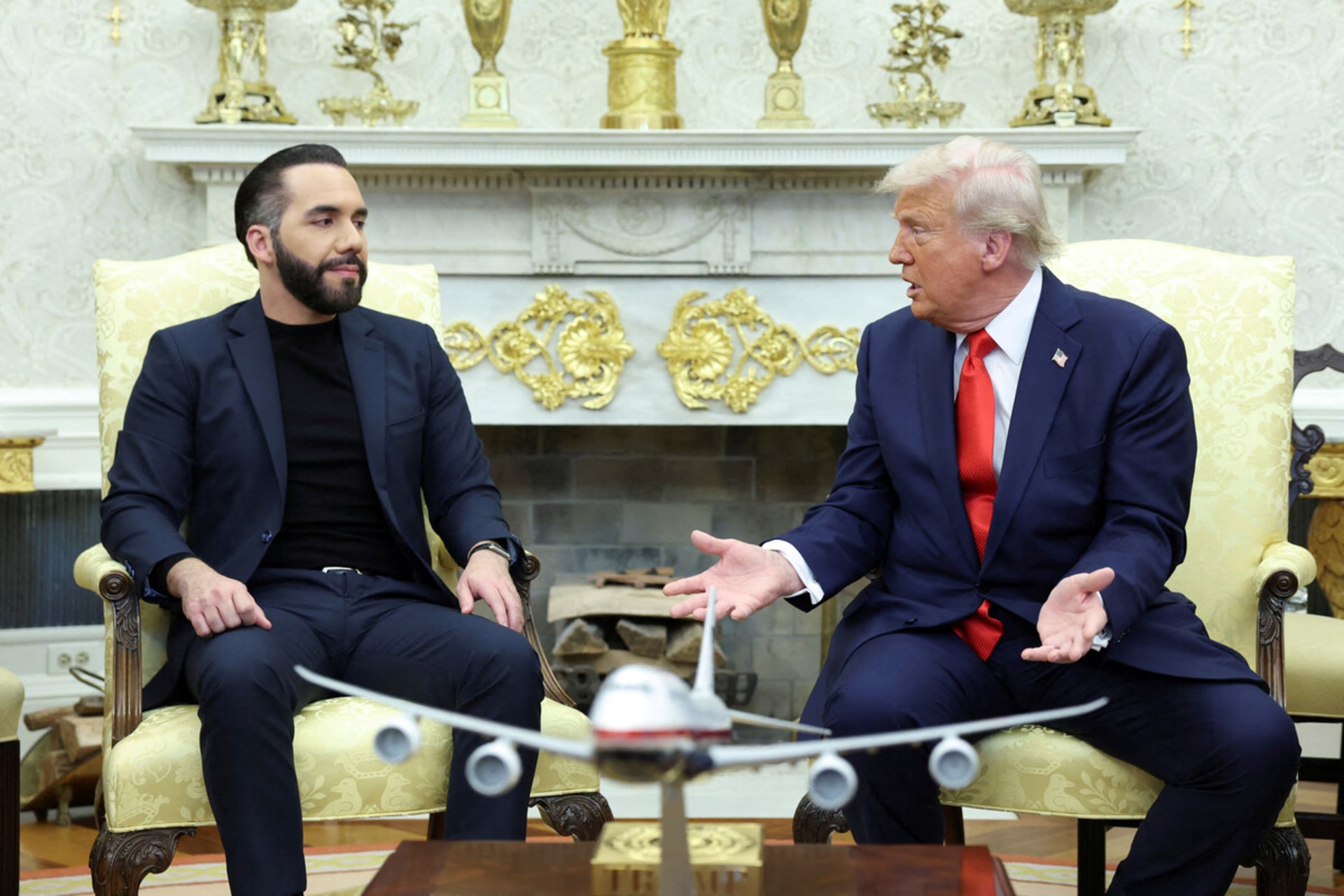Can the Courts Undo Trump’s Deportation of Ábrego García?
CFR law and foreign policy fellow Matthew Waxman answers questions about the Kilmar Ábrego García case, which has put a spotlight on Trump’s immigration and deportation practices and set up a legal showdown between the White House and the courts.

By experts and staff
- Published
Experts
![]() By Matthew C. WaxmanAdjunct Senior Fellow for Law and Foreign Policy
By Matthew C. WaxmanAdjunct Senior Fellow for Law and Foreign Policy
By
- Phil McCauslandNews Editor
The deportation of Kilmar Ábrego García, a twenty-nine-year-old Salvadorian immigrant, from his home in Maryland to an El Salvador mega-prison has set up a legal showdown between President Donald Trump’s administration and the United States’ legal system. It has raised major questions about what oversight the different branches of government have over foreign policy, how the Trump administration will respond to court orders, and what obligations the White House has to protect American due process rights.
Ábrego García was one of more than 260 migrants that the United States sent to El Salvador’s Terrorism Confinement Center (CECOT) last month. This mega prison has served as the backbone of a large-scale gang crackdown led by the country’s president, Nayib Bukele, housing thousands of suspects—and now, individuals deported from the United States after the Trump administration struck a deal with the Central American country.
The U.S. Supreme Court ruled last week that Ábrego García’s deportation was a mistake and the U.S. government must help “facilitate” his return. While Ábrego García arrived in the United States as an undocumented immigrant, he had been granted a protective order in 2019 due to gang threats his family faced in El Salvador. Ábrego García’s lawyers and his family have emphasized that he has never been charged with a crime since arriving in the United States, and they have denied the White House’s claims that he is a member of the gang MS-13.
Since the Supreme Court order last week, President Trump and senior administration officials have maintained that they are unable to secure Ábrego García’s return because he is in Salvadoran custody. Though Washington sent him there, they argue that it is up to the Salvadoran government to decide what to do with him. Bukele said in an Oval Office meeting on Monday that he does not intend to return him to the United States, calling the idea “preposterous.”
Critics of the Trump administration have claimed that the White House’s inaction in response to the Supreme Court ruling has created a constitutional crisis, while cabinet officials such as Attorney General Pam Bondi and Secretary of State Marco Rubio have maintained that this is simply an issue of sovereignty and court overreach on foreign policy.
But the legal issues surrounding the White House’s immigration policy continue to blossom. A lower court judge is now deposing government officials over this case, and a federal judge in a separate case has said that “probable cause exists” to hold the administration in criminal contempt over its hurried deportation flights.
To answer some of the legal questions this and the other cases have raised, CFR turned to Matthew Waxman, adjunct senior fellow for law and foreign policy.
Secretary Rubio has said that he was “confused” by the Supreme Court order to “facilitate” ÁbregoGarcía’sreturn, as “the foreign policy of the United States is conducted by the president of the United States, not by a court.” What discretion do the courts have to determine or affect U.S. foreign policy or compel the executive to act in such cases?
Of course, it’s the elected branches that conduct foreign policy, but it’s also true that courts decide matters that have effects on foreign policy. Every day, judges make decisions in cases about immigration, transnational law enforcement, cross-border commerce, sanctions, and so on, all of which bear on the nation’s external relations. Just this week, we have seen court cases filed to challenge various Trump administration tariffs, for example.
But the courts will generally shy away from inserting themselves directly into sensitive diplomacy. One reason is the basic constitutional concept of separation of powers. Another is that courts typically regard the executive branch as much better informed about diplomatic sensitivities and consequences.
Secretary Rubio might be saying that courts should not interfere in government-to-government interactions, especially at the national leadership level. Historically, courts have indeed been cautious in doing so, and they often find jurisdictional reasons to avoid interjecting themselves, or they defer heavily to executive branch arguments as to why doing so might be diplomatically disruptive. But courts are not barred altogether from enforcing the law in such matters. And the Trump administration’s legal maneuvers and evasiveness may end up pushing courts to play a more active role.
El Salvador’s president has said he will not release Ábrego García or return him to the United States. Trump administration officials have said they cannot compel a sovereign country to act in this instance. How does the sovereignty of a foreign nation affect Ábrego García’s case? Does the United States have any levers that it could pull to fulfill the Supreme Court order and compel El Salvador to act?
It’s true that the president cannot formally compel a foreign government to act, and so a court cannot order the president to do so. But it’s also true that the president has plenty of leverage he could bring to bear here if he wants to actively facilitate Ábrego García’s return.
This president boasts of his deal-making, but somehow, he’s saying that his deal-making only works in one direction.
The Trump administration is complaining of court interference, but this is a problem of the administration’s making. I expect that we’ll see a lot of sloppy policy implementation and sloppy lawyering that draws courts in.
Also, a lesson from the Bush administration’s legal approach in the War on Terror is that pushing claims of presidential power too far can backfire, resulting in judicial opinions that leave the executive branch worse off.
Under the Trump administration, Washington has paid El Salvador $6 million to house prisoners it sends for one year. Trump and Rubio have touted this arrangement, but they have maintained their hands are tied regarding Ábrego García’s case. Does that have any legal bearing here? How could that affect the courts’ perception of the administration?
We’re going to see this issue litigated, and the details of the arrangement will matter. One thing that is sure to bring courts in is a perception that the executive branch is trying to evade them. That will likely make courts more assertive and judicial involvement more intrusive.
For example, it appears to be adopting bad faith interpretations of court orders, such as the order that it facilitate Ábrego Garcia’s return. Political officials and government lawyers are also not being consistent, and the White House is going out of its way to denigrate judges. That sort of rhetoric might play well on social media, but it will backfire in courtrooms.
That said, courts will try to walk a fine line: they will want to enforce their rulings but avoid micromanaging diplomacy. I’d watch for a lot of very contentious back-and-forth between courts and the executive branch, including interventions by the Supreme Court.
The Trump administration has alleged that Ábrego García is a member of MS-13, a group the president has designated a foreign terrorist organization (FTO). How does that designation affect this case? How could it affect a suspected member’s due process rights?
Designating MS-13 as an FTO unlocks a lot of statutory powers to cut off any financial or other support for the group. One important implication of this designation is that anyone subject to U.S. law who provides almost any kind of support, like goods, money, or services, can be held criminally liable. An FTO designation also unlocks special immigration restrictions and powers to seize assets. It’s a way of going after these groups by threatening to go after those who help or work with them.
The executive branch has a lot of discretion in who it designates as an FTO; to date, courts have stayed out of that. But individuals who are subject to specific criminal or civil sanctions can challenge those actions. So, for example, if someone is charged with providing support to an FTO, they’re still entitled to the protections of our criminal justice system.
In a separate case, a federal judge found the Trump administration in criminal contempt of court on Wednesday for violating his order last month to turn around planes carrying deportees to El Salvador. What real power does the court have to constrain the power of the Trump administration? What tools are available to them, and how are they able to enforce them?
We’re wading into unfamiliar waters here. In theory, courts could hold administration officials in civil or even criminal contempt, but prosecutions would have to be done by the executive branch, or are pardonable. If a president is determined enough to violate court orders, then ultimately the check needs to come from the ballot box rather than the court gavels.
This work represents the views and opinions solely of the author. The Council on Foreign Relations is an independent, nonpartisan membership organization, think tank, and publisher, and takes no institutional positions on matters of policy.
